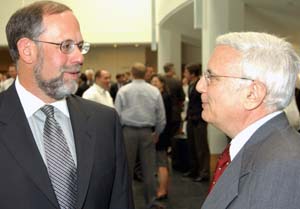Warning that the health-care and insurance industries have not done a good job of educating consumers about the rising cost of health care, Scott Serota, chief executive officer of Blue Cross Blue Shield Association, kicked off the University’s new lecture series on health-care issues with a frank look at the political issues confronting the industry.
Serota was the keynote speaker at the first Frank Bradley Executive Lecture Series, sponsored by the University’s Health Administration Program (HAP).

The lecture series will be held annually.
He said the most important health-care issues facing America today are cost-related — the number of uninsured residents, pharmaceutical costs and the rising cost of medical technology.
The industry is also pressured by a growing aging demographic and increased regulation.
He said most people think that the biggest driver in health-care costs is the cost of prescription drugs, but research has found that 51 percent of the costs revolve around hospitals and use of technology.
Serota, a 1979 HAP graduate, said his organization found that most people perceive that 21 cents of the health-care dollar goes to pure profits.
In reality, he explained that 88 cents of the dollar went toward actual care and only 2 cents went toward company profitability.
“People really don’t understand where their (health-care) dollars go,” Serota said. “The industry as a whole has done a poor job of educating consumers about the value of health-care insurance and the actual cost of medical care.”
To make improvements in health care and to control rising costs, Serota said hospitals, physicians, insurers and others need to come together to find solutions.
“It will take partnership, information, time, understanding and education to meet the demands of the future,” he said. “Right now, we don’t have a choice but to come together because the imperatives are so big. And if we don’t work together to solve this ourselves, the government will step in and solve it for us.”
The HAP was founded in 1946 by Frank R. Bradley, M.D., while he was director of Barnes Hospital.
A pioneer in health-care administration and delivery, Bradley was among the first wave of physicians who understood the critical need for physicians to understand the administrative side of health care.
“The unique nature of the program is that it is based within the School of Medicine,” said HAP Director Stuart B. Boxerman.
“By educating physicians and executives together, we are generating a new breed of practitioners who have an in-depth understanding of health-care issues and who can develop common goals.”
Boxerman added that there is a critical need for professionally educated health-care executives.
The HAP program has produced leaders in all aspects of health care — from hospital presidents to executives in managed care and insurance.